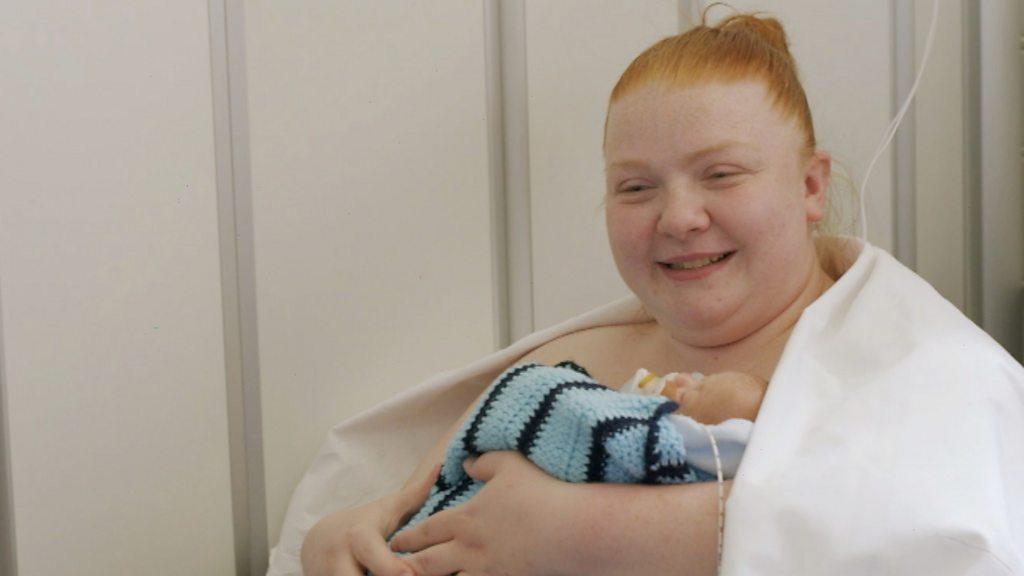Covid: Pregnant women 'opt for C-section' to ensure partners at birth
- Published
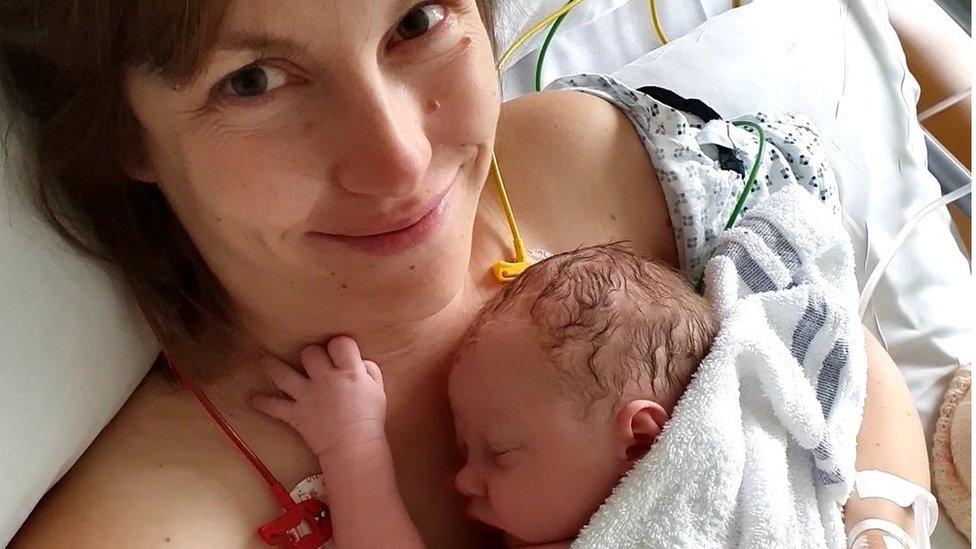
Michelle Morgan Davies elected to have a C-section to ensure her partner Darren would not miss the birth
Some pregnant women are so worried partners will not make it to the birth due to Covid-19 restrictions, they are opting for elective caesarean sections.
According to Wales' coronavirus rules, a birthing partner can still only attend during "active", external labour.
But some mums-to-be say the unpredictability of labour may mean partners do not reach hospital in time.
The Welsh Government said individual circumstances can be taken into account.
Michelle Morgan Davies, from Abergavenny, had baby Finn Morgan by caesarean section on Tuesday, with father Darren standing by.
"A lot of dads and birthing partners are sleeping in their cars and waiting for days in the hospital grounds, scared they will miss the birth if they travel home to be called back too late," she said.
What are the coronavirus rules about partners at births?
In July, rules stopping women from being accompanied to appointments and scans were eased, but not to include early labour.
There are campaigns against this decision, with pregnant women feeling it is unfair people can go to pubs while they must experience parts of birth alone.
Ms Morgan Davies said: "When you compare the maternity restrictions with other activities that are available to us, it makes very little sense.
"The pubs are full, kids are in school in bubbles of 30, a pregnant teacher could be exposed to all those households but can't have her one birth partner in hospital for early labour."
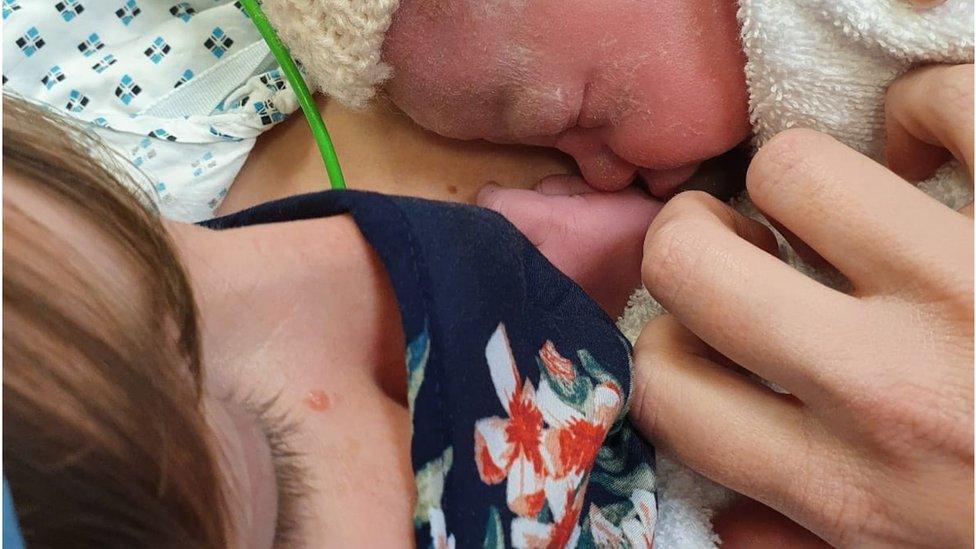
Finn is Ms Morgan Davies' second child - she also has a three-year-old, Greg
Ms Morgan Davies, who described the care she received in hospital as "faultless", said frontline staff were doing their best to support women in difficult circumstances - and the problem lay with the restrictions themselves.
"We were extremely lucky that Darren was able to be with me all through the pre-op process, in theatre and then for five hours afterwards as the ward was too busy to accept me," she said.
"I had been told by staff the previous day that Darren could only be with us for half an hour in recovery before being sent home so that extra time really was a rare and precious thing.
"I know other women aren't getting it and it's devastating."

What is the difference between early and active labour?
The early stages of labour can last for days, and women are usually encouraged to stay home for as long as possible.
When a woman is in active labour, the contractions are usually regular and strong and the cervix dilated by at least 4cm and this stage usually lasts a few hours.
However, it can be unpredictable and even last just minutes before a woman experiences the urge to push - meaning some women are worried they could have the baby without their birth partner or the child's father present.

A C-section, which is major surgery, involves risks including infections, excessive bleeding, blood clots or bladder damage. Recovery can take several weeks.
Catrin Davies, 34, who is due to give birth in October, said she too had considered a C-section in case a fast active labour meant her fiance, Luke ,would not make it in time.
However Ms Davies, from Aberystwyth, was also concerned Luke would not be able to stay with her for long after the birth - with women who have C-sections usually advised to stay in hospital for at least 48 hours.
She said Covid-19 has taken the shine off every aspect of this pregnancy.
"I received a phone call from my midwife saying that the appointments will be over the phone, which, of course, I understand but I was disappointed.
"This pregnancy feels a little forgotten and underwhelming. I cannot stop comparing this pregnancy with my first and feel guilty."
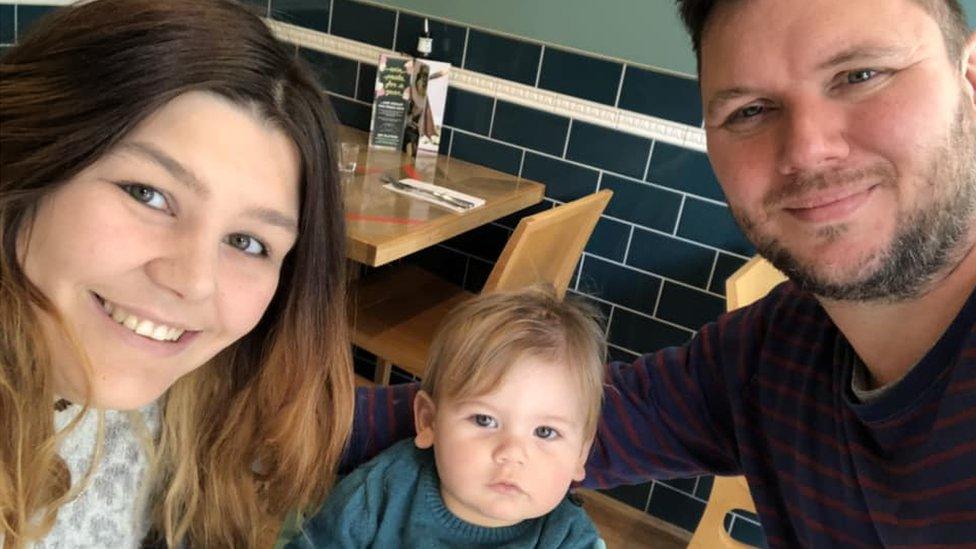
Catrin Davies, who has a two-year-old, says the restrictions have put a dampener on her pregnancy
Ms Davies said her biggest fear had been potentially receiving bad news during scans, which she had before restrictions eased to allow partners to be present.
"Walking into the empty hospital was scary to say the least," she said.
"Afterwards there was no big hug and smiles, just me staring at this scan photo.
"The signal is so poor that I couldn't phone him, I sent him a message saying all is well and a picture... all shared excitement is lost."
When it came to considering birth options, Ms Davies said all she could see were "the cons due to covid".
"An elective C-section has the con of Luke not being able stay with us for very long after. I would also be in hospital away from him and Sam [her two-year-old son] for over 24 hours with our newborn, taking away another experience of the pregnancy and birth.
"A vaginal birth, if this goes well I am only in for six to 12 hours and this is preferable but again I would not have Luke there as a support until active labour.
"I have heard of some [partners] having to sit in their cars for hours on end, this is not ideal but our best option that I can see.
"I know how lucky me and Luke are having another baby, however, covid has put a downer on the experience."
Hannah Albrighton, from south west Wales, started a petition to allow birth partners to be present throughout the pregnancy journey.
"It is unfair that new families can stand two metres apart from complete strangers in a shop, but cannot have their partner or birthing partner there because of covid," she said.
Ms Albrighton added she had heard anecdotes of partners almost missing a birth which progressed quicker than expected, and even women finding out they had miscarried without their partners there to support them.
A campaign to ease labour restrictions - Pregnant Then Screwed, external - is being supported by Plaid Cymru MS Bethan Sayed.
"I understand first-hand how frightening and lonely it can be to be without your birthing partner in early labour and recovery," Ms Sayed said.
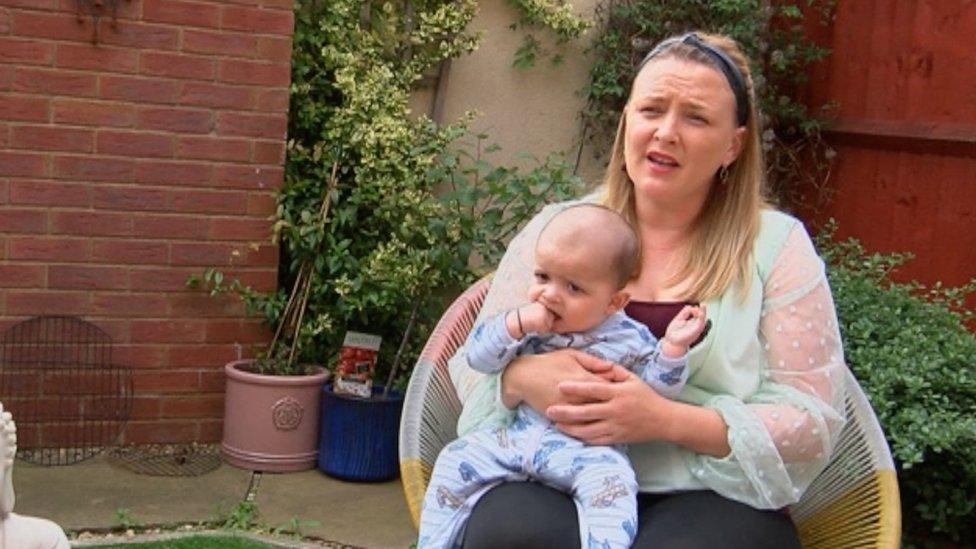
Bethan Sayed is supporting a campaign to allow birth partners to be present throughout
"Partners play a vital role as advocates during the birth process, as well as providing emotional support.
"Too many fathers have also missed out on early bonding moments with their children and we must act now to avoid any further detrimental impact on new families across Wales."
The Welsh Government said: "The safety and wellbeing of mothers and babies, as well as the staff who support them, is at the heart of the maternity visiting guidance at this time.
"A partner can be present when a woman is in active labour.
"Health boards will take individual circumstances into account to enable a partner or a nominated person to be present when a woman is using maternity services if she has mental health needs, a learning disability or a cognitive impairment or needs extra support to process information."
Helen Rogers, director for Wales at the Royal College of Midwives, said there had been a rise in requests for home births during the first wave of the pandemic.
"Women were understandably concerned about attending hospital. This was partly because of uncertainties about having their partner with them, as well as perceived infection risk."
- Published23 July 2020
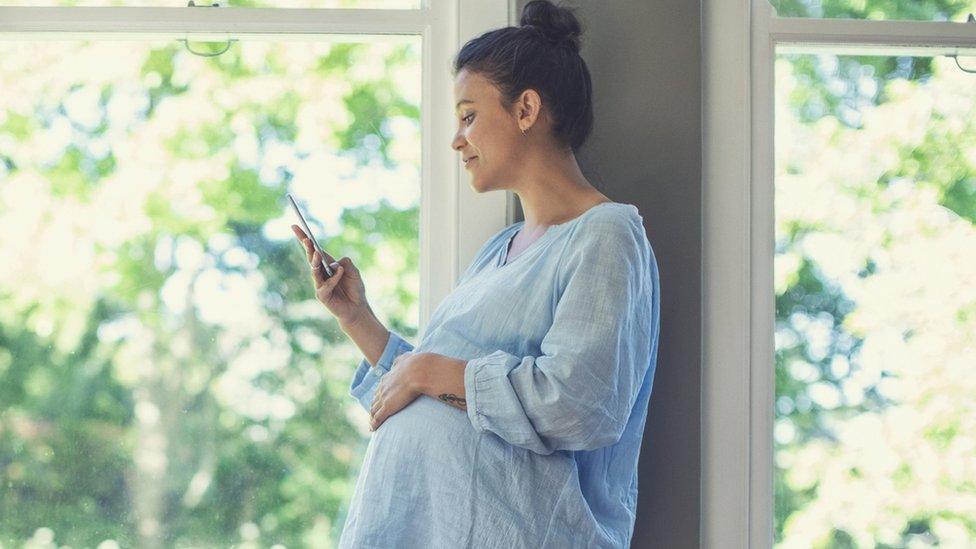
- Published6 April 2020
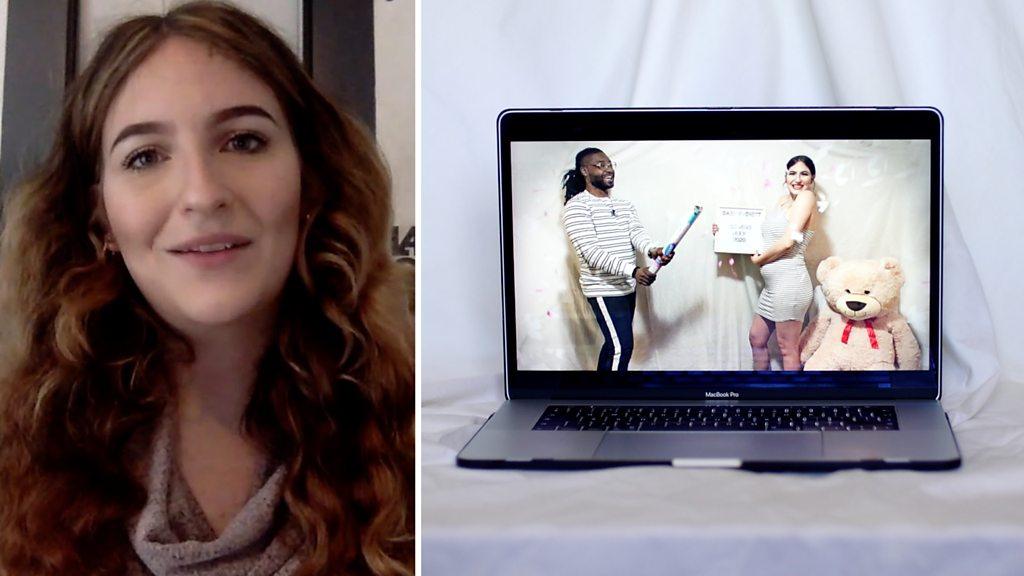
- Published4 August 2020
